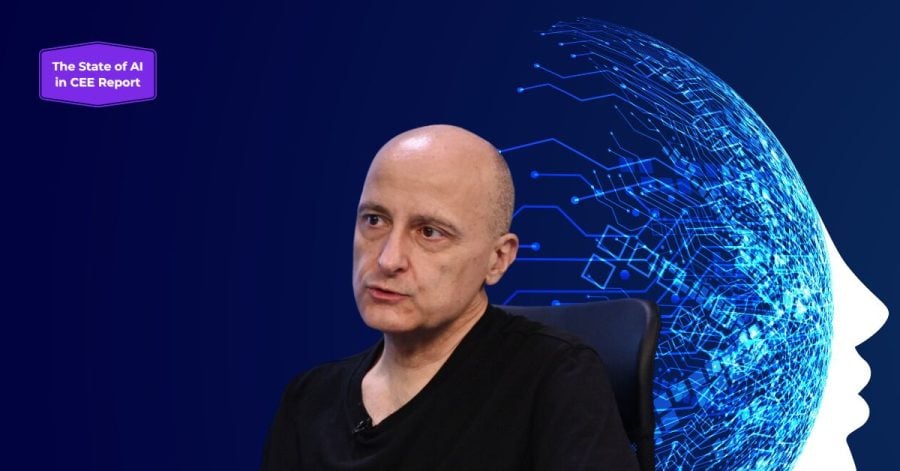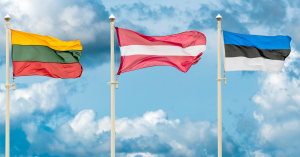What does the future hold for AI adoption in various industries? Macedonian data scientist Stojancho Tudjarski, boasting over 30 years of experience in the field, envisions a widespread integration of this technology in the coming years, including bridging science and industry for creating real-world impacts.
In a recent interview with The Recursive, Tudjarski shares his insights about the transformative impact that AI can have on diverse sectors and CEE’s AI talent, drawing from his rich professional background in contributing to companies and startups in the region, including ones using ML and deep learning techniques in medicine and other fields.
The following interview was conducted as a part of The Recursive’s “State of AI in CEE” report. Download the full report with insights from 40+ experts and an analysis of 900 AI product companies from CEE here.
The Recursive: How do you see the intersection between scientific research and the commercialization of the industry right now?
Stojancho Tudjarski: It is natural symbiosis because science without a use-case is useless bytes on some hard drives, while industry cannot solve problems and commercialize solutions without serious scientific research. So, science alone cannot put its fruits into production, and the industry alone cannot offer something genuinely new. There are plenty of cases in Silicon Valley and all around the world where the leading people in the industry research laboratories are professors in the universities, especially when the number of scientific papers exponentially grows. I’m happy that this is the case in Macedonia as well.
What are the current challenges or pain points in industries across the CEE that AI can address or solve?
Supporting locating and solving environmental issues: air pollution, for example. Another case: optimizing solar energy usage; there is plenty of it in these areas.
What are the potential risks and challenges associated with the adoption of AI in the industry, such as ethical considerations or public acceptance?
Current breakthrough with generative AI exposes significant threat to the employment status of professionals in various professions. ChatGPT is powerful enough to generate answers to a wide variety of questions and to create content with human-like quality, with generalization capabilities at an unseen scale till now, and is cheaper than human employees.
That exposes a severe challenge to institutions worldwide to figure out how to deal with the employees replaced by machines. Maybe not next month or next year, but in ten years, this will likely have to be solved with a goal not to provoke severe social turbulence.
What are your personal concerns when it comes to the ethical implications of AI in your particular area of research?
My primary concern is that the text, images, and videos we can get from the generative AI are so good that they are practically indistinguishable from humans’ utterances, photos, and video recordings. That produces real doubt about whether what we see, read, or communicate with, digitally transmitted, is an actual human or content generated by a machine. Indistinguishable video footage can be AI-generated with any spoken content, so it cannot be trusted. And that is a tremendous shift into what we can believe when we see on the screens, anywhere.
What are the current and upcoming regulatory and legal frameworks in your country or the EU as a whole affecting the adoption of AI products and services?
Regulating AI has emerged as a real issue in the last months as soon as its power becomes apparent. The EU currently leads in the efforts to frame a regulatory act. Still, this process will take some time because it needs to result in something that should be operationalized through the institutions in a meaningful and doable way.
Do you have any recommendations or questions for the policymakers when it comes to AI regulation?
I recommend spending all the energy on the real problem: many people will lose their jobs and ability to buy food because of it. The alignment issue is the second serious problem that is much more subtle, and we must restrict unobserved usage of AI everywhere, where it can autonomously act and provoke actions outside the box that hosts it. The tools that provide technical capabilities for AI-backed agents are already out there; anybody can download them, which is scary.
How would you evaluate the availability and quality of talent with the necessary AI skills in your country/in the region? Which are those necessary skills that businesses and research institutions are looking for?
This region has enough young talents for anything. The actual lack is talents that work in their countries after graduation. Regarding the skills needed for business and research, we need talents with scientific minds and data engineers; AI needs a lot of quality data. Also, we need to put it into production, and here we need MLOps engineers.
Which are the top AI specializations and skills in your country according to you?
Data scientists and Data and MLOps engineers.
How do you evaluate the availability and accessibility of professional development and training opportunities for AI specialists in the region? How do they impact talent retention and attraction when it comes to the AI industry?
Currently, the primary modus operandi for employing IT, including AI specialists, is to make them available to companies in Western Europe and the USA. That is a good thing since it provides jobs for many young people. But the better way to establish talent retention is to make successful local startups with ideas on using AI from the beginning. They will allow local talents to play a significant role in planning these companies’ AI strategies and make an impact while the company begins growing. Unfortunately, this is impossible if you rent local talents to foreign companies because they delegate the execution of already coined plans. Combined with competitive salaries, that can increase talent retention and attraction since the talents can make plans and lead or support their execution in any other possible way.
How do the region’s educational institutions and universities contribute to the talent pool for AI professionals?
Universities currently produce a significant volume of juniors for IT jobs, some of which go into AI-related jobs. Young people with Data engineering skills are already coming from the universities, while the MLOps are in deficit. Data scientists are a different story: the area covers a broad theoretical knowledge taken from the universities, but more is needed. AI needs experience in a field, with a will for constant self-education that comes from the heart. That is something that the universities cannot provide, it is personal, and you can stay relevant in AI only if you like it enough to constantly learn and experiment with the new things, and they appear weekly.
What are the opportunities that you are seeing for cross-industry collaborations or partnerships in AI innovation in our region?
We do have highly motivated talents, and I see that. The question is how to make this region interesting enough for them to stay here. If they stay here, they will work and innovate through their work or their Masters’s or Ph.D. studies, eventually. One of the possible ways to achieve this is to support the startup ecosystem that can raise serious funding. Many Western institutions are willing to give a large amount of money to promising startups, but more than talent, skills, and viable ideas are needed to raise money. A lot of work needs to be done upfront, and it can only be done with proper guidance. I’m happy that there are more and more efforts in the field in that direction, mainly from instructors from abroad but also from domestic ones.
What are the existing communities and networks for AI professionals in the region you are part of, and how do you see their contribution to the development of AI innovation in the region?
Unfortunately, I can’t see something organized here, in Macedonia, beyond two Macedonian Facebook groups. Having a network of AI professionals would be a great idea. They are intrinsically very passionate people willing to exchange knowledge. Also, everybody involved can contribute by recruiting their personal and business contacts to make presentations and Q&A sessions. But so far, no such thing, and that’s sad.
What are the perceptions of the region among AI professionals, and how do they impact talent retention and attraction?
Unfortunately, not good. Domestic companies’ need for AI professionals is low, and we need more local startups to make some difference.
How would you evaluate the potential for growth and development in the AI innovation ecosystem in CEE and why? What is the biggest challenge in your view?
The biggest challenge is keeping the talents in the region. Without talents willing to stay in the country instead of catching the first plane to the EU or US after graduation, we have nothing, so no AI. One possible way to make the talents willing to stay at home countries is to help the growth of the startup ecosystem that would seed startups that can attract foreign money, and with viable ideas elaborated well enough with institutional help, this is possible. A network of AI professionals can only be helpful here.








